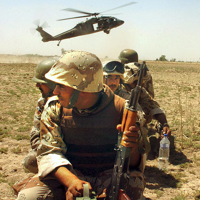Most experts believe that one of the most catastrophic mistakes made during the U.S. occupation of Iraq was the decision to disband the Iraqi armed forces in May 2003. The question is not merely of interest to historians and those writing "after-action" reports on the Iraq invasion. After all, other Iraq-style regimes -- most notably in Syria, Libya and North Korea -- are likely to fall in the near future. In all three states, the armed forces are part and parcel of the longstanding political order, and there will be those arguing for their complete dissolution in order to sweep away the last remnants of the "ancien régime."
Starting from scratch with a new army "free from politically compromised personnel," as Florence Gaub puts it in a recent study of post-conflict militaries in Iraq and Lebanon, may be a noble task in theory, but difficult to achieve in practice. A new Libyan democracy, for instance, will need the skills and institutional memory that current supporters of Moammar Gadhafi will bring. Conversely, if the Libyan rebels were to exclude them from any new arrangements, this would not only slow down the process of reconstruction but even possibly sow the seeds for counterrevolution.
In Iraq, there were plenty of warnings that demobilizing the regular army, in addition to dissolving the security and intelligence apparatus of Saddam Hussein's regime, would have consequences. A pre-invasion briefing had bluntly stated, "Cannot immediately demobilize 250K-300K personnel and put on the street." Many believe that the decision to do so directly fueled the devastating insurgency that crippled efforts at any rapid reconstruction of Iraq and changed the very perception of the Iraqi operation from a swift victory into a stalemated quagmire.

